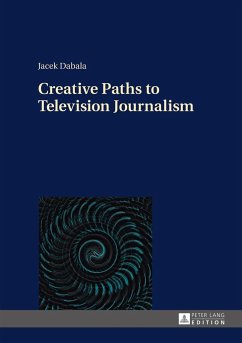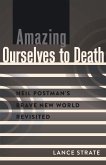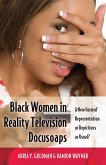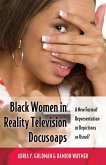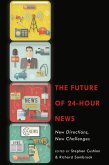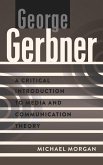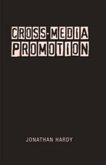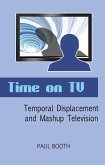The book is a scholarly and creative consideration of audiovisual broadcasting and what makes a TV performance professional. It combines an academic approach to TV News with a practical understanding of production and the new pressures bearing down on the industry. Combining a real-world understanding with a scholarly approach, it offers valuable new insights for aspiring journalists, students, researchers and lecturers into what is still the most powerful medium for news and information in the world.
«This book is an exciting and challenging look at how we can understand the way we regard people and how we create and make public our views of them in and through television. The author provides a critically engaging and detailed analysis of the practical aspects of television journalism and the ethical values replete within it as well as how it is complicit in the construction of the manifold mediated identities of those caught up in the increasingly two-way relationship between broadcaster and audience. This is a wide ranging and well researched account of the dynamics of the significance and impact of television journalism in all its richness and ambiguity.»
(Prof. Jackie Harrison, Chair, Centre for Freedom of the Media (CFOM), Joint Head of Department and Director of Research Department of Journalism Studies, University of Sheffield, UK)
«This book is an exciting and challenging look at how we can understand the way we regard people and how we create and make public our views of them in and through television. The author provides a critically engaging and detailed analysis of the practical aspects of television journalism and the ethical values replete within it as well as how it is complicit in the construction of the manifold mediated identities of those caught up in the increasingly two-way relationship between broadcaster and audience. This is a wide ranging and well researched account of the dynamics of the significance and impact of television journalism in all its richness and ambiguity.»
(Prof. Jackie Harrison, Chair, Centre for Freedom of the Media (CFOM), Joint Head of Department and Director of Research Department of Journalism Studies, University of Sheffield, UK)
«This is a fascinating book. It looks at television journalism in a wholly different way from anything I have previously encountered. It makes the notion of the dramaturgy of news its central point of reference. And Dabala writes from the perspective of someone who is as comfortable dealing with theories of the media as he is in dealing with the theory and practice of script-writing. This book will make anyone involved in television news - whether as scholars, students, practitioners or just viewers - rethink almost everything.» (Prof. Ivor Gaber, School of Media, Film and Music, University of Sussex, UK)
«The tragedy of television 'journalism' is that we so often need to put that word in quotes. This book explains the nature of TV production in a hyper-connected, high-velocity world of information and news. It helps us understand why TV news, flawed as it tends to be, is nonetheless a vital medium for public understanding - and offers some hope that a new generation of producers, and audiences, can make the medium match its best potential.»
(Prof. Dan Gillmor, Walter Cronkite School of Journalism and Mass Communication, Arizona State University, USA)
«This new book combines a scholastic approach to TV News with a practical understanding of production and the new pressures bearing down on the industry. As such it combines a real-world understanding with an objective, academic perspective and offers valuable new insights into what is still the most powerful medium for news and information in the world.»
(Prof. Richard Sambrook, Director, Centre for Journalism, Cardiff University, UK)
«This book takes a new and much more comprehensive approach to Television and its production and role in society. It looks at the production of television both as an art form in which how the presentations are done plays a major role in how their messages are understood and as a technical production process. This new, dual approach is critical for our understanding of the roles television and those who appear in it and produce it as well as for its attraction and its impact both in post-Soviet societies and in traditional Western societies».
(Prof. Jane. L. Curry, Department of Political Science, Santa Clara University, USA)
«In an age when the TV business is a global exchange of images and cultural connections, Jacek Dabala has examined the phenomenon with an internationalist's eye. He connects American observers with intellectuals from Europe to examine the dynamics, the ethics and the demands of journalism in the 21st Century. This is the kind of book that demands thinking on the part of young visual journalists and one that can stimulate an interesting debate involving theory and practice.» (Prof. Susan King, Dean, John Thomas Kerr Distinguished Professor School of Journalism and Mass Communication, UNC Chapel Hill, USA)
«The tragedy of television 'journalism' is that we so often need to put that word in quotes. This book explains the nature of TV production in a hyper-connected, high-velocity world of information and news. It helps us understand why TV news, flawed as it tends to be, is nonetheless a vital medium for public understanding - and offers some hope that a new generation of producers, and audiences, can make the medium match its best potential.»
(Prof. Dan Gillmor, Walter Cronkite School of Journalism and Mass Communication, Arizona State University, USA)
«This new book combines a scholastic approach to TV News with a practical understanding of production and the new pressures bearing down on the industry. As such it combines a real-world understanding with an objective, academic perspective and offers valuable new insights into what is still the most powerful medium for news and information in the world.»
(Prof. Richard Sambrook, Director, Centre for Journalism, Cardiff University, UK)
«This book takes a new and much more comprehensive approach to Television and its production and role in society. It looks at the production of television both as an art form in which how the presentations are done plays a major role in how their messages are understood and as a technical production process. This new, dual approach is critical for our understanding of the roles television and those who appear in it and produce it as well as for its attraction and its impact both in post-Soviet societies and in traditional Western societies».
(Prof. Jane. L. Curry, Department of Political Science, Santa Clara University, USA)
«In an age when the TV business is a global exchange of images and cultural connections, Jacek Dabala has examined the phenomenon with an internationalist's eye. He connects American observers with intellectuals from Europe to examine the dynamics, the ethics and the demands of journalism in the 21st Century. This is the kind of book that demands thinking on the part of young visual journalists and one that can stimulate an interesting debate involving theory and practice.» (Prof. Susan King, Dean, John Thomas Kerr Distinguished Professor School of Journalism and Mass Communication, UNC Chapel Hill, USA)

